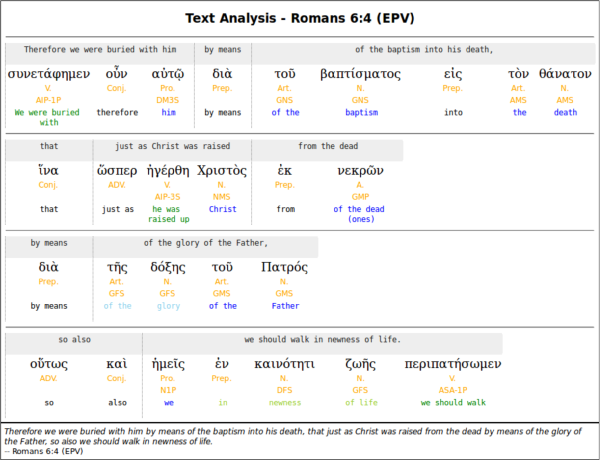διὰ
It can be a fool's game to hang Greek translations on prepositions, as the range of meaning is different from English and so we don't naturally read words in their intended range. But at least we have clues in this text to help us get started on the meaning of διὰ.
Fortunately this sentence uses the term twice, such that 'we were buried διὰ baptism into death' in the same way that 'the Messiah was raised from the dead διὰ the glory of the Father'. This does suggest the author's intention is indeed to use the word causatively, as the first διὰ is more plainly causative.
"Having been buried with him in baptism, you also have been raised with him through your faith in the power of God who raised him from the dead." - Colossians 2:12
This parallel passage is relevant because the ultimate authorial intent of both passages is to teach about the new life of the Christian by drawing on the death/resurrection of Jesus. In the Christian the resurrection happens through faith, in a similar sense in which Jesus' resurrection happens through the glory of God.
In this second case Paul also happily swaps out the first διὰ for ἐν, demonstrating that being buried with Christ happens in/through baptism. Thus we should be hesitant to place too strong an emphasis on preposition choice. Incidentally, we see also ἐν in use by Jesus in a similar context:
"For the Son of Man will come with his angels in the glory of his Father, and then he will reward each person according to what he has done." - Matthew 16:27 NET (pp. Mk 8:38, Lk 9:26 also extends glory of son & angels)
δόξης
This can be a challenging word for us in English, as its root lies in an intrinsic sense of worth or honour, literally evoking good opinion by its own merit. As BDAG assert, there is certainly an 'allowable' sense in which δόξης may encompass 'power' (or even authority) within its larger sense in some contexts as demonstrated by John 2:11.
In 2 Corinthians 3:11 Paul says that [that which was fading away] was literally διὰ δόξης, "through glory", referring back to 3:7 in the sense that the tablets of the Law were produced 'in glory'. This is not really a causative sense, as the sense of the passage suggests that the glory is more of an enveloping presence surrounding the law.
In 2 Corinthians 6:8 Paul also talks about his trials occurring διὰ δόξης καὶ ἀτιμίας, "through glory and dishonour", also in a non-causative sense where the 'glory' would appear to be a general, wider state of affairs.
Proposed Conclusion
Thus when we get to Romans and are trying to understand Paul's intention in διὰ τῆς δόξης τοῦ πατρός, we know that there is at the least a sense of envelopment in the δόξης of the Father, and at the most a direct causation.
Given our parallel in Colossians 2:12, a direct causation seems unlikely, given that the Christian's resurrection cannot be a direct causation of their own faith (ie. they can't be raising themselves). Ideally we need a sense in which both verses make sense.
A non-direct, consequential kind of causation fits with both passages - the Christian has been raised as an outcome of their faith, but not by the faith itself. The Messiah similarly was raised as a consequence of the Father's inherent glory and worthiness, not because that glory itself was the resurrecting force, but because that enveloping glory inherently demands that death should not hold him.
This makes sense in view of the NT's wider view of the Messiah, that he is the "image of the invisible God" (Col 1:15), the "radiance of God's glory and the exact representation of his being" (Heb 1:3), who "existed in the form of God" (Php 2:6). It is therefore not strange to consider this Messiah being raised as a consequence of the glory of the Father, as sharing this same glory would not permit him to remain in the grave.
The authorial intention of the passage is to teach on the new life of believers as that relates to the Messiah. In this context, where Paul is saying that the Christian's "entirely new life" is similar to the resurrection brought about διὰ τῆς δόξης τοῦ πατρός, this sort of aspirational tone fits well, and so I would translate approximately:
'Therefore, through baptism we were buried with him into his death so that, in the same way that the Messiah's resurrection was brought about by the glory of the Father, so [by that same glory] we should walk an entirely new life.'
Still, we should be careful not to make too much of a minor clause which could just be a throw-away phrase.
Alternative Conclusion
Separating Greek clauses can be a challenge, and so it could be that we are over-complicating the passage by trying to read in more than is actually there. For the sake of an extra comma, the meaning becomes much simpler:
Therefore, through baptism we were buried with him into his death so that, just as the Messiah was raised from the dead, by the Father's glory, we too may live an entirely new life.
It's possible that the 'by the Father's glory' is more of a subordinate phrase, rather than the actual point of the sentence. I can't propose this as my preferred choice as all translations I've found seem to uniformly associate the glory directly with the Messiah's resurrection, but at face value it certainly seems possible from how the passage is structured.
